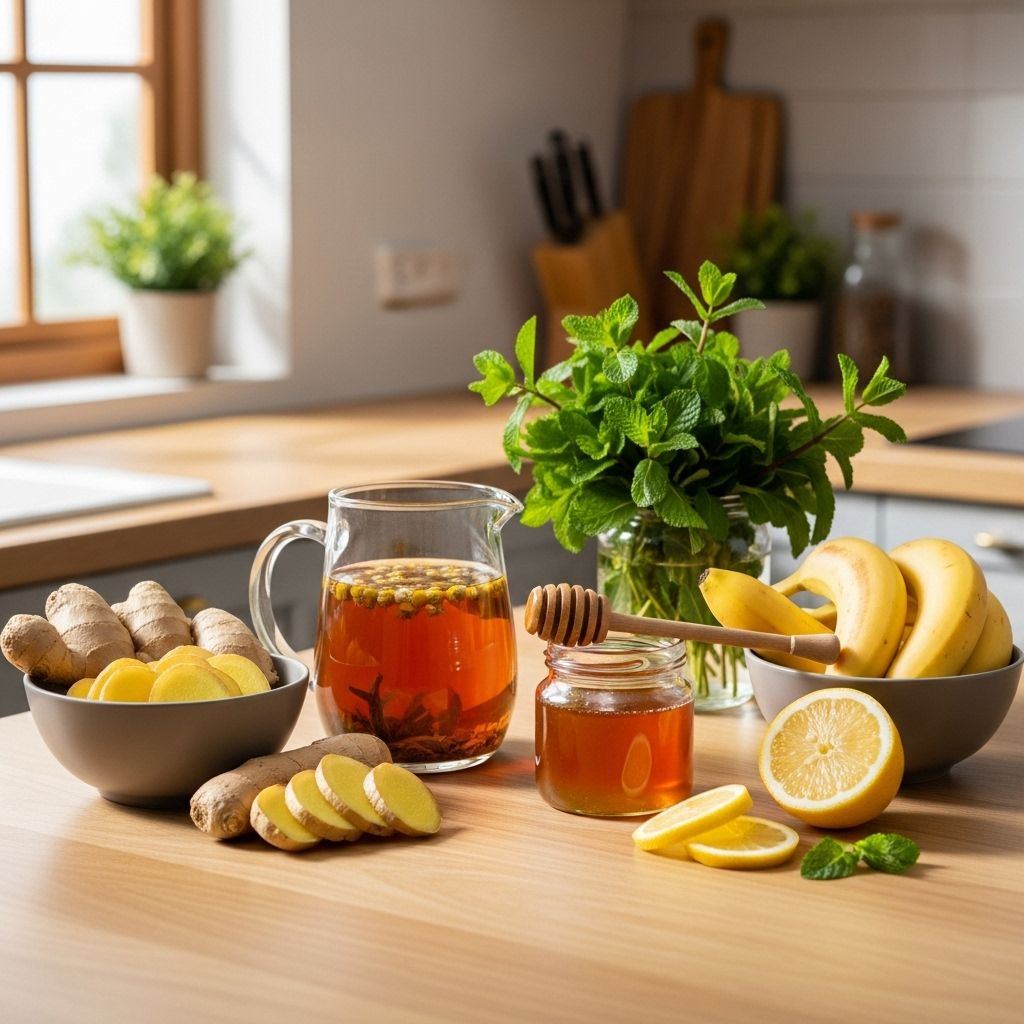Home Remedies for Acid Reflux: Evidence-Based Tips to Soothe Heartburn Naturally
Discover the most effective natural remedies for acid reflux relief and prevention.

Table of Contents
- What Is Acid Reflux?
- Causes and Symptoms
- Lifestyle and Dietary Changes
- Foods That Help Acid Reflux
- Foods to Avoid
- Herbal and Natural Remedies
- Stress Management and Sleep Tips
- Frequently Asked Questions
- When to See a Doctor
What Is Acid Reflux?
Acid reflux, often experienced as heartburn, occurs when stomach acid flows back into the esophagus, causing irritation and discomfort. Occasional acid reflux is common, but recurrent episodes (gastroesophageal reflux disease, or GERD) may require medical attention. Home remedies can often help manage mild to moderate symptoms and prevent flare-ups.
Causes and Symptoms
Common causes of acid reflux include overeating, lying down after meals, obesity, pregnancy, and certain medications. Symptoms include a burning sensation in the chest (heartburn), regurgitation, difficulty swallowing, and sometimes a chronic cough or hoarseness.
Lifestyle and Dietary Changes
Meal Size and Timing
- Eat smaller, more frequent meals to reduce pressure on the lower esophageal sphincter (LES), the muscle that prevents acid from flowing backward.
- Avoid eating within 3–4 hours of bedtime to allow your stomach to empty.
Sleep Position
- Elevate the head of your bed by 6–8 inches, or use a wedge pillow, to keep stomach acid from rising into your esophagus at night.
Avoid Triggers
- Identify and avoid foods and beverages that trigger your symptoms (see Foods to Avoid).
- Maintain a healthy weight—excess abdominal fat can increase reflux risk.
Foods That Help Acid Reflux
- Oatmeal: Absorbs stomach acid and is high in fiber, which aids digestion.
- Bananas: Low in acid, can help coat the esophagus and soothe irritation.
- Melons (cantaloupe, honeydew): Low-acid fruits that are generally non-irritating.
- Green Vegetables: Broccoli, asparagus, and leafy greens are low in fat and sugar, reducing acid production.
- Lean Proteins: Chicken, turkey, and fish are less likely to trigger symptoms compared to fatty meats.
Foods to Avoid
Certain foods and drinks can relax the LES or irritate the esophagus, worsening acid reflux. Common triggers include:
- Spicy foods
- Tomatoes and tomato-based products
- Citrus fruits and juices
- Chocolate
- Mint (peppermint, spearmint)
- Garlic and onions
- Fatty or fried foods
- Caffeinated beverages, alcohol, and carbonated drinks
Keeping a food diary can help identify your personal triggers.
Herbal and Natural Remedies
Ginger
Ginger has anti-inflammatory properties and may reduce nausea and reflux symptoms. Try ginger tea or small amounts of fresh ginger with meals.
Aloe Vera Juice
Aloe vera juice may soothe the esophageal lining, though scientific evidence is limited. Choose products made for internal use.
Apple Cider Vinegar
Some people find relief by taking a teaspoon of apple cider vinegar diluted in water, though evidence is anecdotal and it may worsen symptoms in others.
Chewing Gum
Chewing sugar-free gum after meals may increase saliva, helping to neutralize and clear stomach acid from the esophagus. Avoid mint flavors, which can relax the LES.
Baking Soda
A teaspoon of baking soda in a glass of water can neutralize stomach acid quickly, acting as a temporary antacid.
Probiotics
Probiotics may aid digestion and gut health, though their direct benefit for acid reflux is unclear. Use reputable brands if you decide to try them.
Other Suggestions
- Alkaline Water: Drinking alkaline water (pH ~9.5) with meals may help neutralize acid.
- Alginate: Found in some over-the-counter products, alginate creates a barrier to block acid from the esophagus.
Stress Management and Sleep Tips
Chronic stress can increase acid production and affect digestion, worsening reflux. Practices such as meditation, yoga, and regular physical activity may help manage stress and reduce symptoms.
Quality sleep is also crucial—aim for 7–8 hours per night and avoid eating before bedtime.
Frequently Asked Questions
Q: Can I use peppermint for acid reflux?
A: Peppermint may relax the LES and worsen reflux for some people. If you experience increased heartburn, try ginger instead.
Q: Does apple cider vinegar help with acid reflux?
A: It works for some, but can make symptoms worse for others. Try a small amount diluted in water and monitor your reaction.
Q: Are bananas good for acid reflux?
A: Bananas are generally low-acid and well tolerated, but not everyone benefits. They are safe to try as part of a reflux-friendly diet.
Q: How should I sleep to reduce nighttime reflux?
A: Elevate your head with a wedge pillow or by raising the head of your bed to use gravity to keep acid in your stomach.
Q: When should I see a doctor?
A: See a healthcare provider if you have frequent or severe symptoms, difficulty swallowing, unintended weight loss, or if over-the-counter remedies do not provide relief.
When to See a Doctor
While home remedies can help, persistent or severe symptoms may indicate GERD or other conditions requiring medical treatment. Seek care if you experience chest pain, difficulty swallowing, vomiting, or weight loss without cause.
Conclusion
Acid reflux can often be managed with dietary changes, lifestyle adjustments, and safe natural remedies. Identify your personal triggers, eat smaller meals, elevate your head while sleeping, and use gentle remedies like ginger or aloe vera juice as needed. Consult your doctor if symptoms persist or worsen.
References
- https://www.bswhealth.com/blog/7-natural-remedies-for-acid-reflux
- https://www.franciscanhealth.org/community/blog/home-remedies-for-heartburn
- https://thocc.org/about/news-press/news-detail?articleId=52210&publicid=395
- https://www.health.harvard.edu/newsletter_article/9-ways-to-relieve-acid-reflux-without-medication
- https://my.clevelandclinic.org/health/diseases/17019-acid-reflux-gerd
- https://www.houstonmethodist.org/blog/articles/2021/dec/home-remedies-for-heartburn-10-ways-to-get-rid-of-acid-reflux/
- https://www.mayoclinic.org/diseases-conditions/gerd/diagnosis-treatment/drc-20361959
- https://www.nhs.uk/conditions/heartburn-and-acid-reflux/
Read full bio of Sneha Tete












